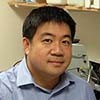2023 Sexual Medicine Research Fund Awards Announced
Nelson Lau, Jai Marathe, Glenn Markenson, and Ann Zumwalt have received 2023 Sexual Medicine Research Fund awards.
 Nelson Lau, PhD, associate professor of biochemistry, is teaming up with Joseph Zaia, PhD, professor of biochemistry, and Raghuveera Goel, PhD, BU Center for Network Systems Biology, to discover new protein factors affecting male fertility. This grant will support novel DNA pulldown and mass spectrometry approaches to directly identify protein factors that interact with the fertility genes called “piRNA gene clusters” in mammalian testes. This approach, which has worked in Drosophila ovaries, will discover new targets that may cause male infertility diseases in humans.
Nelson Lau, PhD, associate professor of biochemistry, is teaming up with Joseph Zaia, PhD, professor of biochemistry, and Raghuveera Goel, PhD, BU Center for Network Systems Biology, to discover new protein factors affecting male fertility. This grant will support novel DNA pulldown and mass spectrometry approaches to directly identify protein factors that interact with the fertility genes called “piRNA gene clusters” in mammalian testes. This approach, which has worked in Drosophila ovaries, will discover new targets that may cause male infertility diseases in humans.
 Jai Marathe, MBBS, MS, assistant professor of medicine/infectious diseases, and Deborah Anderson, professor of medicine/infectious diseases, are developing products using topical monoclonal antibodies (mAbs) for contraception and STI prevention. Vaginal films containing anti-HIV and anti-HSV mAbs, and a contraceptive mAb, HCA, showed promise in recent Phase I clinical trials evaluating feasibility, safety and ex vivoefficacy. They propose to now evaluate the feasibility of delivering anti-HIV mAbs in sexual lubricants for on-demand pre-exposure prophylaxis for HIV prevention.
Jai Marathe, MBBS, MS, assistant professor of medicine/infectious diseases, and Deborah Anderson, professor of medicine/infectious diseases, are developing products using topical monoclonal antibodies (mAbs) for contraception and STI prevention. Vaginal films containing anti-HIV and anti-HSV mAbs, and a contraceptive mAb, HCA, showed promise in recent Phase I clinical trials evaluating feasibility, safety and ex vivoefficacy. They propose to now evaluate the feasibility of delivering anti-HIV mAbs in sexual lubricants for on-demand pre-exposure prophylaxis for HIV prevention.
 Glenn Markenson, MD, professor of obstetrics & gynecology, and director, Center for Military Health and Victoria Wyant, MPH, CPH, from the Center for Military Health, are teaming up with the Boston Trauma Institute to complete a pilot study researching sexual function in women with traumatic brain injuries. Currently, there are more than 200,000 servicewomen active in the military, constituting 16.5 percent of all active-duty forces. This pilot research will be crucial to help the Center establish preliminary data for planned applications to Congressionally Directed Medical Research Program grants and future NIH R01 grants.
Glenn Markenson, MD, professor of obstetrics & gynecology, and director, Center for Military Health and Victoria Wyant, MPH, CPH, from the Center for Military Health, are teaming up with the Boston Trauma Institute to complete a pilot study researching sexual function in women with traumatic brain injuries. Currently, there are more than 200,000 servicewomen active in the military, constituting 16.5 percent of all active-duty forces. This pilot research will be crucial to help the Center establish preliminary data for planned applications to Congressionally Directed Medical Research Program grants and future NIH R01 grants.
 Ann Zumwalt, PhD, associate professor of anatomy & neurobiology, will examine medical school faculty knowledge and attitudes around gender and sexually diverse (GSD) topics specifically, and biological sex and gender generally, and how these perspectives impact learners. The School’s mission is to train practitioners who care for and about all populations, especially those from underserved populations. In combination with this ethos, the project will position the School to become national leaders in addressing root causes of GSD health-care inequities.
Ann Zumwalt, PhD, associate professor of anatomy & neurobiology, will examine medical school faculty knowledge and attitudes around gender and sexually diverse (GSD) topics specifically, and biological sex and gender generally, and how these perspectives impact learners. The School’s mission is to train practitioners who care for and about all populations, especially those from underserved populations. In combination with this ethos, the project will position the School to become national leaders in addressing root causes of GSD health-care inequities.
Congratulations!
View all posts